FALL 2025
PAʻAKEA
IN THIS ISSUE
Alumni and faculty drive climate justice at ITLOS and ICJ
Hawaiʻi Supreme Court justices discuss samesex marriage and constitutional protections
New partnership enhances legal aid for Hawaiʻi families at Kapi‘olani Medical Center
Law school celebrates 50 years since its founding
The official publication of the William S. Richardson School of Law



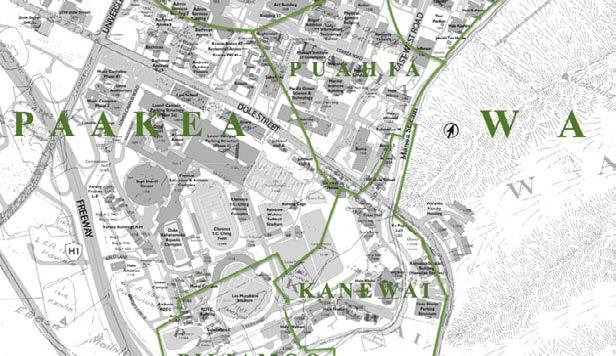

Named after the traditional land on which our law school stands, Paʻakea embodies our commitment to place, resilience, and community. This title honors both the enduring connection to our ‘āina and the solid foundation from which we share stories of achievement, scholarship, and service. Through Paʻakea, we celebrate and share Richardson’s legacy of justice and excellence to Hawai‘i and beyond.

A MESSAGE FROM DEAN CAMILLE NELSON
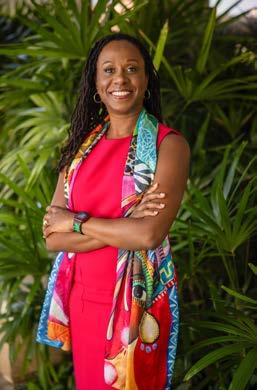

Aloha Richardson ʻOhana,
We are pleased to introduce Paʻakea, the official magazine of the William S. Richardson School of Law. This annual publication highlights the mission-driven work that defines our school, celebrating the people, progress, and programs that shaped the past year at Richardson Law.

We have continued to grow in ways that reflect our core values, including kūpale (to protect and advocate), kuleana (responsibility), and nā‘au pono (a sense of justice or balance). Our community has fostered student leadership, developed innovative legal tools, advanced international climate work, and strengthened connections, all in the spirit of our founder, Chief Justice William S. Richardson.
We celebrated the 50th anniversary of both our law school and the Ulu Lehua Scholars Program. We have worked to expand access to justice, invested in student success, and earned national recognition for leadership, innovation, and service.
Each story, whether about a student, faculty member, alumni, administrator, or community partner, demonstrates the collective strength of our Richardson ʻohana and the enduring impact of this extraordinary law school. Mahalo for being a part of our story.
With gratitude,
Camille A. Nelson
Dean and Professor of Law
William S. Richardson School of Law
NEWS & FEATURES
06 CLIMATE JUSTICE
HISTORIC CLIMATE SETTLEMENT
Alumni play key role in settlement for constitutional climate case.
JULIAN AGUON
Prominent human rights lawyer to serve as Inouye Chair at UH Mānoa.
THE GLOBAL IMPACT OF RICHARDSON LAW
Alumni and Faculty Drive Climate Justice at ITLOS and ICJ.
COMMUNITY & CONNECTIONS
LABOR LAW
Historic gift creates first endowed chair in labor law at Hawaiʻi’s Law School.
MEDIATION TRAINING
Alumni gift supports mediation education and training for law students


ALUMNI SUCCESS
CHIEF-OF-STAFF APPOINTEE
Alumna appointed by U.S. Senator
FIRST CIRCUIT COURT
Alumni make history with trio of judge appointments in Hawai‘i
ALUMNI FEATURE: DANICOLE RAMOS
Danicole Ramos ’23 honored with Clare Hanusz Award for immigrant justice leadership
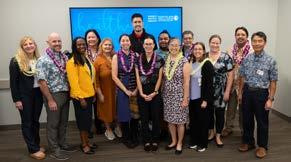
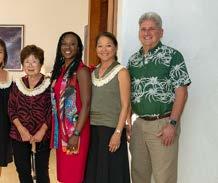
20 INNOVATION & AI
CODING FOR LAWYERS
Innovator in residence expands access to coding class.
EXPUNGEMENT AUTOMATION TOOLS
Law school launches new tool at free legal clinic.
24 STUDENTS LEAD THE COMMUNITY
STUDENT REGENT APPOINTED
Law student Joshua Faumuina joins University of Hawaiʻi Board of Regents.
STUDENT OF THE YEAR
Benjamin Leider named one of The National Jurist’s 2025 Law Students of the Year
32 INTERNATIONAL JAPANESE LEGAL EXCHANGE
Japanese law leaders visit to discuss international programs
GLEN FUKUSHIMA VISIT
Glen S. Fukushima visits Richardson Law for student talk and reception
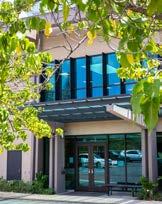
46 CELEBRATING 50 YEARS
RICHARDSON LAW TURNS 50
Law school celebrates 50 years since its founding
LEHUA PROGRAM
ANNIVERSARY
Ulu Lehua Scholars Program celebrates 50 years of excellence
MARRIAGE EQUALITY SEMINAR
Hawaiʻi Supreme Court justices discuss same-sex marriage and constitutional protections
SOIFER LECTURE SERIES
Richardson Law launches the Soifer lectures with inaugural speaker Professor Ellen P. Goodman
NATIONAL
RECOGNITION
Dean Camille Nelson receives Deborah L. Rhode Award
Ulu Lehua Scholars Program honored with prestigious 2024 Diversity Leadership Award from the American Bar Association
UH Law School receives $250,000 grant for professional identity development
Richardson alumni key in historic youth-led climate case settlement

July 3, 2024
Alumni from the William S. Richardson School of Law at the University of Hawaiʻi at Mānoa played a key role in securing a historic settlement in the Navahine v. Hawaiʻi Department of Transportation case, announced by Governor Josh Green on June 20, 2024. This groundbreaking resolution, led by youth plaintiffs, mandates transformative actions for Hawaiʻi’s sustainable future and acknowledges the constitutional rights of the state’s youth to a life-sustaining climate.
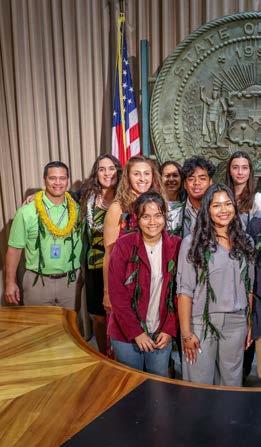
This landmark achievement highlights the profound impact of Richardson alumni on environmental justice. It is also vital for the people of Hawaiʻi as it sets a precedent for proactive climate action and the protection of constitutional rights. “At a time where the role of law is ever present, the transformative work of Richardson Law alumni shines through.
The impact of Richardson alumni in this case and its settlement is a stellar example of the ways in which they have made a difference in our communities, both near and far.

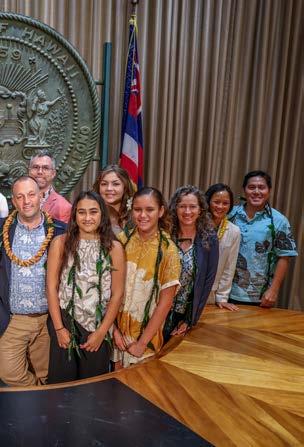
Their intellect, hard work, expertise and commitments have contributed to a monumental settlement, one that will serve as a leading light in many other jurisdictions,” said Dean Camille Nelson.
Isaac Moriwake ‘98, Managing Attorney of Earthjustice’s Mid-Pacific Office, emphasized the critical role Richardson alumni played in the case. “Richardson alums were intensively involved in all sides of the case, which was a key factor in shaping the case and its pathbreaking resolution. We understood and internalized Hawai‘i’s pioneering legal principles that lay the foundation for the case

and settlement. And we shared the community connections and commitment to place that made the forward-looking cooperative resolution possible,” Moriwake said.
The resolution in the Navahine case is a historic step toward the climate justice the world needs because it acts on the government’s climate obligations to children and Native Hawaiians and embraces bold leadership and collaboration to bring change for Hawai‘i and far beyond. The climate crisis is humanity’s ultimate group project, in which we work together or fail apart. It’s no coincidence that Hawai‘i—and Richardson lawyers—are helping lead the way forward for our island community and island Earth,” said Marti Townsend ’05 who led community engagement for the case.
Senior attorney Kylie Wager Cruz ‘13 of Earthjustice and attorney Joanna Zeigler ‘15 of Our Children’s Trust also played vital roles in supporting and representing the plaintiffs. In addition, alumnus Ciara Kahahane ‘19 represented the Hawaiʻi Department of Transportation as Deputy Attorney General.
As we recognize this historic settlement, the William S. Richardson School of Law urges all Hawaiʻi residents to stay informed and engaged in the conversations about climate justice. These are important conversations for our state and region and we look forward to the ongoing leadership of our faculty and alumni in this important area.
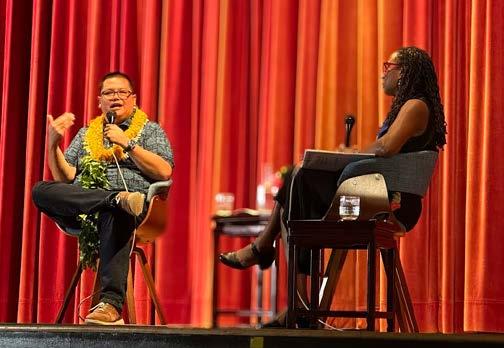
July 30, 2024
Prominent human rights lawyer to serve as Inouye Chair at UH Mānoa

International human rights lawyer Julian Aguon ‘09 has been selected as the Dan and Maggie Inouye Distinguished Chair in Democratic Ideals at the University of Hawaiʻi at Mānoa for Fall 2024.
Aguon will begin his residence on September 4, with a reading from his forthcoming book and a conversation moderated by Camille Nelson, Dean of the William S. Richardson School of Law.
Aguon is the visionary behind Blue Ocean Law, a progressive firm that works across Oceania at the intersection of indigenous rights and environmental justice. For the past five years, Julian and his team have served as legal counsel to the Republic of Vanuatu, which has spearheaded the historic pursuit of an advisory opinion on climate change from the International Court of Justice.
Aguon is an award-winning author of several books and articles, including To Hell with Drowning, which in 2022 earned him Pulitzer Prize recognition. He is also the author of No Country for EightSpot Butterflies, a book that has been praised by everyone from Arundhati Roy and Alice Walker to Rebecca Solnit and Tommy Orange.
a semester-long residency at this critical moment in the climate crisis to uplift the rights and justice struggles of Pacific Island communities,” she continued.
Aguon will be in residency at UH Mānoa for the entire fall semester. During that time, he will co-teach (with Professor Susan Serrano) Pacific Island Legal Systems at the law school, while participating in class visits and community forums. The chair is hosted by the law school, together with the Department of American Studies in the College of Arts, Languages and Letters.

Established in 2005 by the UH Board of Regents, the Dan and Maggie Inouye Distinguished Chair in Democratic Ideals brings significant public figures to Hawaiʻi to foster public discourse regarding democratic ideals and civic engagement. The program honors U.S. Senator Daniel Inouye and his wife, Maggie, for their lifetime of public service.
Former Inouye chairs include acclaimed political activist and author Angela Davis, ACLU National Legal Director David Cole, Pulitzer prize-winning novelist Viet Thanh Nguyen, and more.
“Julian Aguon is a powerful global voice in the courts, on the written page, and on the ground in communities across Oceania,” said Dean Nelson. “Through razorsharp legal analysis, searing political commentary, and moving storytelling, he urges radical listening to those most vulnerable. We are honored to have Julian join us for
The opening event, “On Earning Hope for the Future,” was held last year on Sep. 4 at 6:30 p.m. at Orvis Auditorium at the University of Hawai’i at Mānoa. ❖
The Global Impact of Richardson Law
Alumni and Faculty Drive Climate Justice at ITLOS and ICJ
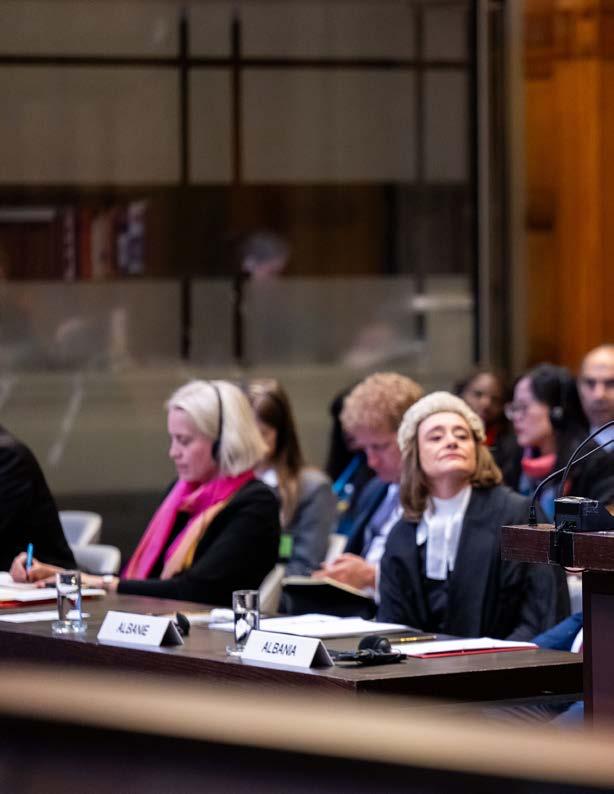
The William S. Richardson School of Law at the University of Hawaiʻi at Mānoa has cemented its reputation as a leader in international environmental law and climate justice. This year, Richardson alumni, faculty, and students played pivotal roles in two historic cases: the International Tribunal for the Law of the Sea (ITLOS) Advisory Opinion and the International Court of Justice (ICJ) hearings on climate change.
These cases mark critical moments in global efforts to hold nations accountable for the devastating impacts of climate change, especially for small island states most vulnerable to its effects.
“The pivotal roles our alumni, faculty, and students have played in these historic cases underscore the power of a Richardson education,” said Dean Camille Nelson. “Our Pacific-focused curriculum, rooted in values of justice, aloha, and sustainability, prepares leaders to address the most pressing challenges of our time. Together, we are advancing climate justice and creating a more fair future for vulnerable communities worldwide.” Jan. 23, 2025
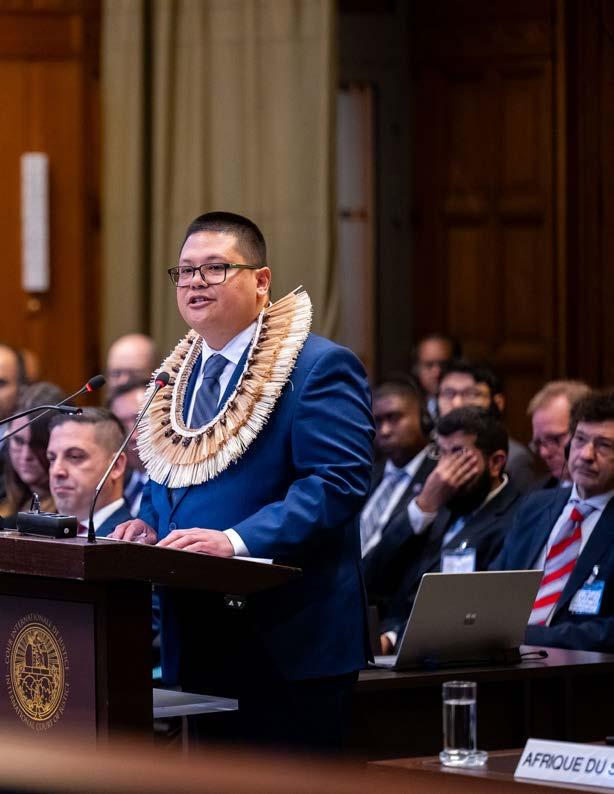
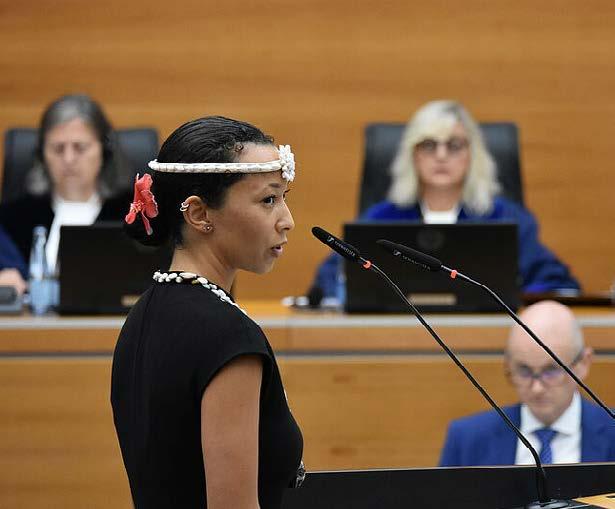
ITLOS advisory opinion
In May 2024, ITLOS delivered a groundbreaking advisory opinion declaring that greenhouse gas emissions constitute pollution that harms the marine environment. The court emphasized the legal obligations of states to mitigate emissions, setting a powerful precedent for climate accountability. Richardson alumni and faculty were central to this decision.
Naima Te Maile Fifita ‘23 served as Counsel for the Commission of Small Island States on Climate Change and International Law (COSIS), representing them at the oral hearings in Hamburg. “Representing COSIS in this historic advisory opinion was both a profound honor and a humbling experience. Advocating for small island states on the global stage underscored the pressing existential threats climate change poses to our communities. The collaboration with legal experts and states highlighted the importance of solidarity in achieving climate justice.”

“Advocating for small island states on the global stage underscored the pressing existential threats climate change poses to our communities.
Fifita reflected on how courses like environmental ethics, Pacific legal systems, and international law provided a strong foundation for addressing the intersection of climate resilience and legal frameworks. “Richardson’s emphasis on reciprocity, aloha, and social justice remains central to my work today.”
Clement Yow Mulalap ‘10 also played a significant role, representing Micronesia in the hearings. Drawing on his extensive expertise in international law, Mulalap emphasized the unique vulnerabilities of Pacific nations and the urgent need for accountability from larger states contributing to climate change.
Sherry Broder, a Lecturer in Law, contributed to the International Union for Conservation of Nature’s (IUCN) written submission, drawing from her expertise in international environmental law. In addition, Julian Aguon ‘09 and his firm, Blue Ocean Law, supported COSIS in their submission, continuing their advocacy for Pacific Island nations.
ICJ hearings
In December 2024, the ICJ held hearings on a request led by Vanuatu, with 98 states and 12 international organizations participating. This unprecedented case seeks to establish the legal obligations of nations to protect vulnerable populations from climate change impacts. Once again, Hawaiʻi’s Law School was at the forefront.
Julian Aguon ‘09, Inouye Distinguished Chair in Democratic Ideals, represented Vanuatu through his firm, Blue Ocean Law, presenting critical arguments on behalf of the nation. Reflecting on the significance of this case, Aguon said, “This case is about unlocking the
power of international law to address the climate crisis. It’s a massive effort, years in the making, and its potential to advance climate justice for frontline communities—especially small island developing states—is monumental.”
Clement Yow Mulalap ‘10 also represented Micronesia in the ICJ hearings, drawing from over a decade of experience in international environmental law.
Solomon Yeo, a recent LLM graduate, and Andrew Awa, a current LLM student, played key roles in early efforts with Pacific Island Students Fighting Climate Change. Their efforts helped persuade Vanuatu to spearhead this historic initiative.
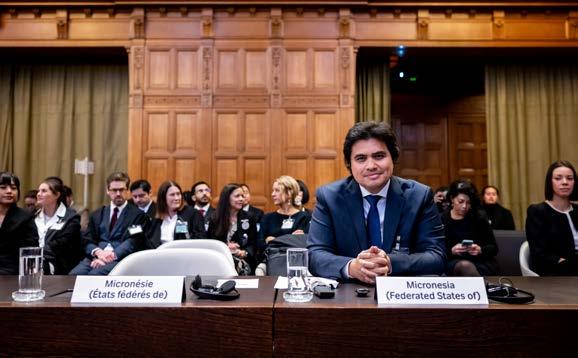
For Andrew Awa, this case represents the culmination of years of relentless efforts. Reflecting on his early involvement with Pacific Island Students Fighting Climate Change (PISFCC), Andrew recalls the initial 2019 meetings with Oxfam Vanuatu and the Ministry of Climate, often held outside the lecture theater at Emalus Campus.
“I still remember when we launched our first campaign, sailing in a Va’a canoe from Blue Lagoon to the Port Vila seafront with a banner that read, ‘We are not drowning; we are fighting.’ It was a powerful and emotional moment that symbolized our resolve,” said Awa.
Despite skepticism from some colleagues and scholars who doubted the feasibility of bringing their claims to the ICJ, Andrew and his peers persisted. Their collective effort, supported by organizations like Oxfam Vanuatu and the Vanuatu Government, alongside the dedication of 27 student campaigners, kept the momentum alive.
“Seeing our efforts come to fruition on such a significant stage is incredibly rewarding. It’s proof that student-led initiatives can inspire global change and bring climate justice to the forefront.”
Andrew’s journey embodies the grassroots energy that drives Richardson’s global impact, connecting the school’s students and alumni to pivotal movements in international law.
Richardson’s legacy
The active involvement of Richardson alumni, faculty, and students in these cases highlights the school’s unwavering commitment to international law, environmental law, and climate justice. Through its Pacific and Indigenous-focused curriculum, Richardson
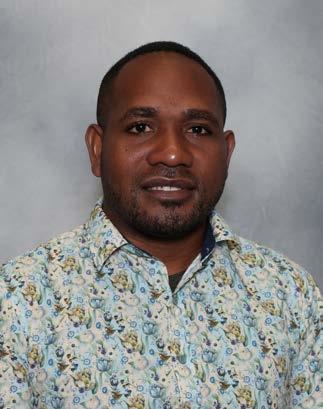
equips its graduates with the knowledge, skills, and values to address some of the world’s most pressing challenges, fostering leaders who create meaningful change both locally and globally.
As the world faces the intensifying effects of climate change, Richardson Law stands at the forefront of innovative legal education and justice, driving solutions for a more fair and sustainable future.
Join us in celebrating the William S. Richardson School of Law’s legacy of leadership. Your support helps us empower the next generation of legal leaders dedicated to justice, resilience, and sustainability. ❖

Historic gift Historic gift creates first endowed chair in labor law at Richardson
Sept. 03, 2024
Agift from the Leonard Hoshijo Memorial Foundation will create the first endowed chair in labor law at the William S. Richardson School of Law at the University of Hawaiʻi at Mānoa. The contribution is the largest donation ever received by the law school and stands as the most significant gift for an endowed chair in UH history.
The Leonard Hoshijo Endowed Chair in Labor Law honors Hoshijo, a passionate advocate for workers, who died in 2021 at age 69.
The Leonard Hoshijo Endowed Chair in Labor Law will allow the law school to hire a labor law scholar dedicated to teaching, writing, and researching the laws that affect employees and those represented by a union.
Additionally, it will support students interested in facilitating fair and safe labor practices through paid graduate assistantships and opportunities for mentorship and research.
The gift also provides support for a Leonard Hoshijo Visiting Fellow, a visiting scholar or advocate who will support experiential learning opportunities in labor law for students who will gain direct experience in the
service of local community members. “As the only law school in the state, UH Mānoa’s William S. Richardson School of Law has an obligation to train students in all areas of the law, including the complicated areas of labor and employment law,” said UH Mānoa Provost Michael Bruno. “As technology changes the modes of work, it’s essential education keeps pace with modern practices.”
“We are grateful for this incredible gift from the Leonard Hoshijo Memorial Foundation,” said Dean Camille Nelson of UH Mānoa’s William S. Richardson School of Law. “This vision and commitment recognizes a crucial area for
our students and curriculum and provides an educational opportunity that will benefit the larger community in myriad ways.”
“This historic gift honoring Leonard Hoshijo reflects his commitment to improving the lives of workers in Hawaiʻi through his tireless efforts,” said Tim Dolan, UH vice president of advancement and CEO of UH Foundation. “We’re grateful for the foresight of the Leonard Hoshijo Memorial Foundation’s gift, which will ensure our law school is a leader in labor law education in the 21st century.”
“Leonard was an exceedingly smart and progressive visionary,” said LHMF board member, Joanne Kealoha, who worked alongside Leonard at the ILWU for many years. “He devoted his entire adult life to organizing workers, advancing labor unions, and advocating justice for working people.”
“We hope this new position at the law school will inspire law students to choose labor law to represent Hawaiʻi’s working men and women,” she said. “Workers not only need union representation but legal representation as well.”
Workers not only need union representation but legal representation as well. “
—Joanne
Kealoha
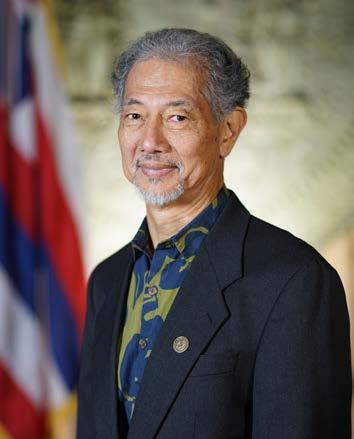
Leonard Paul Hoshijo served as both deputy director and director of the state Department of Labor and Industrial Relations under Gov. David Ige after a long career with the International Longshore and Warehouse Union (ILWU) and the Hawaiʻi Regional Council of Carpenters.
Hoshijo graduated from Kalani High School and went on to graduate from Antioch College before completing a post-graduate degree in education from the University of Hawaiʻi at Mānoa, where he was also involved in the struggle to establish the Ethnic Studies Program.
Hoshijo also served in volunteer leadership and other roles for groups including the Hawaiʻi Council for Housing Action, national board of the Asian Pacific American Labor Alliance (APALA), Hawaiʻi Visitors and Convention Center Bureau, 90th Anniversary of Okinawan Immigration Committee, Hawaiian Electric Company Integrated Resource Advisory Group, the Center for Labor Education and Research (CLEAR) at the University of Hawaiʻi , State Judicial Selection Committee, Blood Bank of Hawaiʻi and the Hawaiʻi Labor Heritage Council. ❖
William S. Richardson School of Law receives generous gift to support mediation training
May 6, 2025

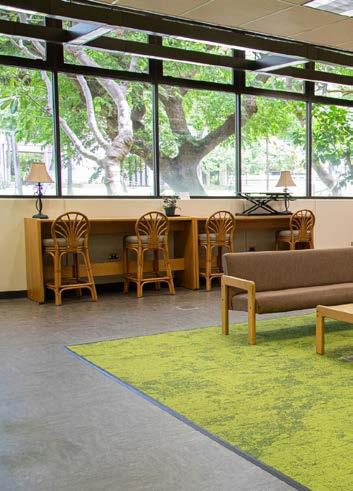
The William S. Richardson School of Law is proud to announce a generous gift from alumni Mahi Hiatt (Class of 1993) and Jerry Hiatt (Class of 1977) to support mediation education and training for law students.
Mahi and Jerry made this gift in appreciation for the education they received at Richardson and in recognition of the vital role mediation plays in resolving legal disputes. Both have built successful careers as litigators before becoming full-time neutrals, and they’ve seen firsthand how mediation can help even the most complex and challenging cases reach resolution.
They hope this gift will help prepare future generations of Richardson graduates with the practical skills they need to mediate disputes early and fairly, especially in family law and complex civil cases, so that individuals and communities can move forward in peace.
“We are deeply grateful to Mahi and Jerry Hiatt for their generous support and for sharing their vision with us,” said Dean Camille Nelson. “Their gift helps us continue preparing students to be skilled, compassionate problem-solvers who serve their communities with integrity.”
The funds will provide a lasting resource for mediation education at Richardson, creating opportunities for students to gain hands-on experience in alternative dispute resolution as part of their legal training.
For more information about supporting the William S. Richardson School of Law, contact our Director of Development, Inna Kraner. ❖
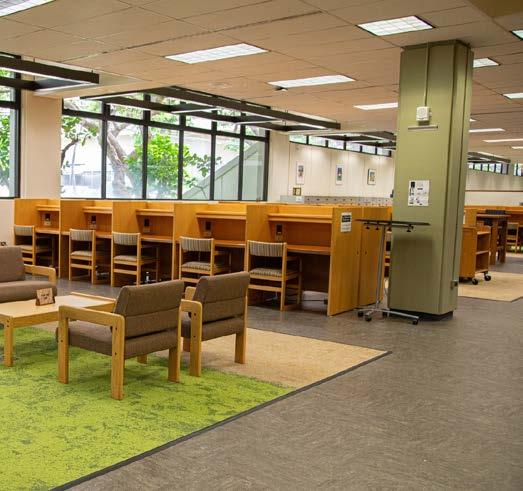
Innovator in residence expands access to popular “Coding for Lawyers” class
Innovator in Residence
Matthew Stubenberg at the William S. Richardson School of Law has offered his highly requested class, “Coding for Lawyers”, during the Spring 2025 semester. In addition, the course is now also being offered to students in the online JD program.
This innovative course is “one of only a few in the country where law students actually learn how to code and build legal tech applications,” Stubenberg said. Throughout the semester, students create small applications to help automate a variety of the tasks that a typical lawyer encounters throughout their legal career, such as soliciting clients, writing motions and conducting legal analysis.
“The Coding for Lawyers course benefits students by providing them with practical coding skills and a deep understanding of computer automation’s capabilities and limitations. This knowledge enables them to identify legal tasks that can
be automated and to work more effectively with software developers to create applications that streamline these tasks,” Stubenberg said.
With the advent of Artificial Intelligence, it is becoming increasingly important for lawyers to have a solid understanding of technology. They can no longer simply rely on the IT department; instead, they must feel comfortable with technology on a level that previous generations of lawyers did not need to.
Matthew Stubenberg has been involved in legal tech for more than a decade. He has created numerous legal tech applications for legal aid groups and Harvard Law School’s Access to Justice Lab. His extensive experience and expertise make him a valuable asset to the William S. Richardson School of Law, and his course provides students with essential skills for the future of legal practice. ❖

Aug. 2, 2024


Richardson Law School introduces new expungement automation tool at free legal clinic
Oct. 31, 2024
The William S. Richardson School of Law recently participated in a free legal clinic, introducing a new expungement automation tool developed by Innovator-in-Residence Matthew Stubenberg and law student Ben Leider. On Sept. 28 at Waiʻanae Public Library, in just four hours, nearly 120 people received legal assistance to expunge arrest records and recall bench warrants.
The event, coordinated with partners including the Hawai‘i State Judiciary, the Office of the Public Defender, ACLU Hawai‘i and the Hawai‘i Workers Center, provided crucial support to community members in clearing old legal issues that can create barriers to employment, housing and other opportunities.
“The chrome extension was an indispensable asset during the clinic by expediting the records research that was done by the attorneys to determine the eligibility of an applicant for expungement,” said Edward (Eddie) Aquino, Deputy Public Defender at the State of Hawaiʻi Office of the Public Defender. The tool analyzes the case data on eCourt Kokua and uses an algorithm to assist the attorney in determining

whether a case is eligible for expungement. After each case has been analyzed the tool generates a completed expungement application, a summary of the cases determined to be eligible for expungement, as well as the request letters to seal court records upon approval of the expungement.
This clinic marked the soft launch of the tool, offering real-time feedback from attorneys and attendees. In total, 72 applications for expungement and 39 bench warrant recall requests were processed during the clinic.
“The expungement process in Hawaiʻi offered a great opportunity where the addition of technology could really help scale the great work done by the volunteer attorneys. Instead of tediously filling out paperwork the attorneys can

now spend that time communicating with the client and ultimately helping more people in less time,” said Stubenberg. “There are still many more areas in the law where technology can help make attorneys more efficient and ultimately increase access to justice.”
Recognizing the rapid transformation of legal practice due to advancements in technology, Richardson Law School has recently expanded its curriculum to include courses in legal technology and innovation. The school now offers
classes such as “Artificial Intelligence & Social Justice,” “Coding for Lawyers,” “Cybersecurity & the Law” and more. These courses foster a culture that encourages students to think creatively in addressing legal challenges.
One such student, Ben Leider, enrolled in “Coding for Lawyers” and realized the significant impact a few lines of code could have on improving access to justice. “The rise of consumer AI is what really brought home for me how overdue law is for truly massive disruption, whether
by AI itself or by good old-fashioned programming logic,” Leider said. Leveraging the skills he acquired, Ben collaborated with Professor Stubenberg to develop an expungement tool.
Richardson Law’s involvement in the initiative reflects its strong commitment to expanding access to justice within the community. This engagement also provides students with valuable hands-on legal experience, as well as exposure to creating legal technology applications. ❖
Governor appoints Richardson law student to UH Board of Regents
July 08, 2024
William S. Richardson School of Law at the University of Hawaiʻi at Mānoa is pleased to announce that law student Joshua Faumuina has been appointed to the UH Board of Regents as the board’s student regent. Gov. Josh Green announced this two-year term on June 28.
Faumuina earned an Associate of Science degree in natural science from Kapiʻolani Community College in 2016, a Bachelor of Arts in classics from UH Mānoa in 2022, and expects to receive his Juris Doctor from the William S. Richardson School of Law in 2026. He has supported several National Science Foundation and Title III grants at Kapiʻolani CC since February 2020.
“I am thrilled to serve the University of Hawaiʻi as the Student Regent. I have been a UH student for over a decade, and I look forward to bringing that experience to the Board of Regents. Beyond that, I view this appointment as a “seat at the table,” not just for myself but for Pacific Islanders, Samoans, queer people, and even nontraditional students. It is my sincere hope to make my communities proud in my role,” Faumuina said.
Interim Associate Dean of Student Services
Trisha Nakamura said, “it is such an honor for the William S. Richardson School of Law to have one of our students named to serve as a Regent. Joshua is dedicated and approachable. He deeply cares about the University and our communities. His multifaceted understanding of the University system alongside his training at Richardson will allow him to make significant and important contributions to the Board of Regents.” ❖
“[...] I view this appointment as a ‘seat at the table,’ not just for myself but for Pacific Islanders, Samoans, queer people, and even nontraditional students.”
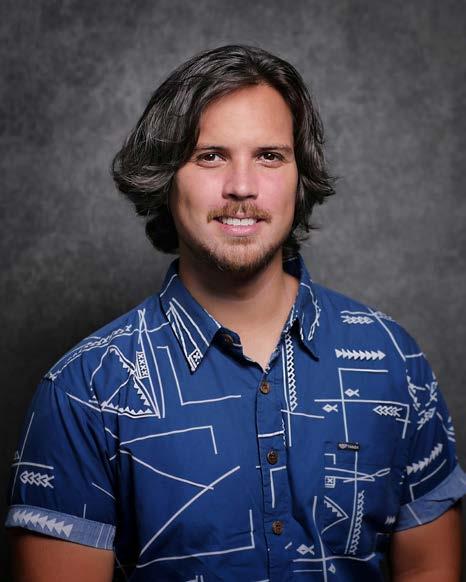
UH law student
Benjamin Leider named the National Jurist Law Student of the Year for legal tech innovation
Benjamin Leider, a third-year student at the William S. Richardson School of Law, has been named one of The National Jurist’s 2025 Law Students of the Year—an honor that recognizes future legal leaders making an impact across the country. Leider was selected for his groundbreaking work developing an expungement automation tool that is already transforming access to justice in Hawaiʻi.
After taking the Coding for Lawyers course offered at Richardson Law, Leider joined Innovator-in-Residence Matthew Stubenberg as a research assistant on a legal technology project aimed at streamlining the expungement process. The result: a Chrome extension that determines whether a criminal case is eligible for expungement and then automatically populates the paperwork required to file.
The application’s goal was to reduce the barriers people face when trying to clear their records—especially those who cannot afford legal representation. Leider helped turn that vision into reality by building legal logic trees, coding the tool, collecting user feedback, and refining the application for use in legal clinics.
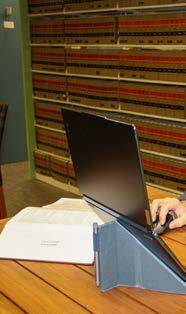
April 23, 2025
The tool had its soft launch at a free legal clinic in September 2024, where it helped 72 people begin the process of expungement. Its success led the Hawaiʻi Office of the Public Defender to request added functionality for bench warrant recalls—a feature Leider implemented earlier this year.
The National Jurist noted Leider’s ability to “perfectly combine both the technology requirements and the legal requirements to make the app work.” In their published profile, Leider also shared this advice for future lawyers:
“Look at the job market and your skills; choose your path accordingly,” he said. “If you want to make a difference in the world or in society, go with what moves you, and be determined.” (Quote published in The National Jurist, April 2025)

Leider is also developing an AI-powered mock trial simulator that allows users to upload case materials and participate in interactive trials—an innovative approach to experiential legal education.
“We could not be happier for Ben. His positive engagement at Richardson Law has been as innovative as it has been transformative. He is an exemplary recipient of this recognition as a National Jurist Law Students of the Year,” said Dean Camille Nelson.
Leider’s recognition not only celebrates his individual achievements but also highlights Richardson Law’s commitment to producing lawyers who are ready to lead, innovate, and make a difference from day one.
Read the full profile and list of honorees at The National Jurist. ❖
“If you want to make a difference in the world or in society, go with what moves you, and be determined.”

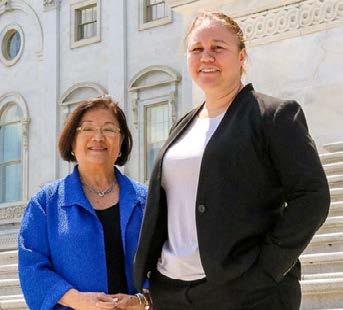
UH law school alumna rises to U.S. senator’s chief of staff
The first Native Hawaiian woman to serve as chief of staff for a U. S. Senator is a 2007 graduate of the University of Hawaiʻi at Mānoa William S. Richardson School of Law. Born and raised in Hawaiʻi, Coti Haia grew up splitting her time between Mililani and Waimānalo and spending summers on Lānaʻi. She has served in her current role for Sen. Mazie Hirono since 2022.
May 21, 2024
—Reposted from UH News
“There would be days when you walk in the Capitol, it would become mundane, and then one day you’d stop and be like, ‘My gosh, I’m in the Senate, this is crazy.’”
Coti Haia
“There would be days when you walk in the Capitol, it would become mundane, and then one day you’d stop and be like, ‘My gosh, I’m in the Senate, this is crazy,’” said Haia. “I’ve been able to work for Hawaiʻi the entire time, and that’s really important to me.”
Haia graduated from Punahou School and Gonzaga University and worked as deputy prosecuting attorney for the City and County of Honolulu after earning her law degree. She moved to Washington, D.C. in 2010 to work for the late U.S Sen. Dan Inouye before moving to Hirono’s office in 2013 after her election to the Senate.
After a two-year stint as the D.C. Bureau Chief for the Office of Hawaiian Affairs, she returned to Hirono’s office in 2018 as the deputy chief of staff, and was promoted four years later to chief of staff.
Paddling in the same direction
“Every day is something different. Some would say that your responsibility is to put out the biggest fire of the day,” said Haia. “Sometimes the fires can be as big as, ‘Do we have enough copies of a bill to file down on the
“ What I try to say to them is to not sell yourself short and to know what is important to you.
Coti Haia
Senate floor?’ And sometimes they can be significantly more challenging. I like to think of it as helping everyone paddle the canoe in the same direction. And sometimes that means going around an obstacle or through one.”
She does not dwell on her trailblazer status as the first Native Hawaiian woman chief of staff, and possibly the first ever Indigenous woman in that position in the history of the U.S. Senate.
I think the way it plays out in our office is ensuring a level of diversity,” said Haia. “Senator [Hirono] has the most diverse staff in the Senate, and that’s because we have the opportunity to work with, and represent, such a diverse state. There are colleagues of mine who are from Hawaiʻi Island, Maui, Kauaʻi, all over Hawaiʻi to help us inform the work we do.”
Introduction to D.C. via UH law school
Her first exposure to Washington, D.C. was while she was at UH through an internship with Sen. Dan Inouye offered through the law school’s Ka Huli Ao Center for Excellence in Native Hawaiian Law.
“It’s not as if I ever planned to come to D.C. to work on policy, but it was through UH that I was able to do that,” said Haia. “Hawaiʻi has many unique laws specific to our state because of the Native Hawaiian community. The Center for Excellence in Native Hawaiian Law helped put an emphasis on parts of the federal government’s relationship with the native community that you would not learn at other law schools.”
Haia is still in touch with many of her professors, which has been useful with Hirono serving on the Senate Judiciary Committee.
“I can email them whether they are retired or not and ask them for their thoughts,” said Haia, who said it would take all day to list the professors who have had a positive impact on her. “I especially want to shout out Melody MacKenzie ’76, Eric Yamamoto and Hazel Beh ’91. We have a lot of aspiring law students who come to work here and those that are from Hawaiʻi, I strongly encourage them to go to Richardson.”
Encouraging the next generation
She said January 6, 2021, was her worst day since moving to D.C. more than a dozen years ago. On the flip side, there have been victories.
“I’m really a policy person, that’s what I came to the Senate to do, and we’ve had some really big policy wins,” said Haia, who adds that she is also proud of how outspoken Hirono has become in recent years. “She definitely began to use her voice during the Trump administration. Whether you agree with his policies or not, it was very clear that Sen. Hirono was a diametric opposite on pretty much every policy he had.”
Despite being in the seat of power of one of the most powerful countries in the world, one of Haia’s favorite parts of her job is lunch with the office interns.
“What I try to say to them is to not sell yourself short and to know what is important to you,” said Haia. “Be prepared to take an opportunity and to trust that you’ll succeed at it. I never in a million years would have guessed that I would be working in the U.S. Senate and certainly not in this position.”
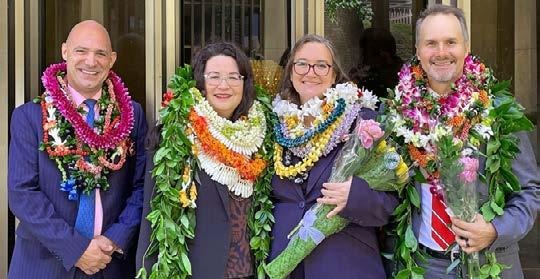
RICHARDSON ALUMNI MAKE HISTORY WITH TRIO OF FIRST CIRCUIT COURT JUDGE APPOINTMENTS IN HAWAIʻI
The State of Hawaiʻi has appointed three alumni from the William S. Richardson School of Law as judges in the Circuit Court of the First Circuit. Judge Brian Costa ʻ01, Judge Dyan Medeiros ʻ96 and Judge Steven Nichols ʻ02, once sworn in, will each serve a term of ten years.
Dean Camille Nelson said that Richardson is delighted to see that the excellence of Richardson Law alumni continues to be recognized at the highest levels. “We are incredibly proud of Judge Costa, Judge Medeiros and Judge Nichols. We know they will continue their dedicated service as they take on new roles on the bench.”
“They are stellar examples of the activation of the mission of the William S. Richardson School of Law to cultivate strong ethical professionals whose leadership and service uplift and enhance communities near and far,” Dean Nelson said.
Judge Brian Costa ‘01 currently serves as a District Family Court Judge, handling divorce, annulment, paternity, protection
July 17, 2024
orders, juvenile delinquency and more. Before his judicial role, he was an Attorney Member Manager at Costa & DeLacy.
Leading the Domestic Division as a District Family Court Judge, Judge Dyan Medeiros ‘96 oversees divorce cases. She also presided over juvenile criminal and child welfare cases in the Juvenile Division, as well as paternity, restraining orders, adoption and guardianship cases in the Special Division.
Judge Steven Nichols ‘02 is a per diem District Family Court Judge. He is also in private practice, Law Office of Steven R. Nichols, where he focuses on criminal defense cases. Previously, he was a Deputy Public Defender at the Office of the Public Defender.
This historic appointment not only highlights the exceptional caliber of Richardson Law alumni but also reinforces the school’s commitment to producing leaders who positively impact the judiciary and the broader community.
For more information about the William S. Richardson School of Law and its programs, visit law.hawaii.edu. ❖
ALUMNI

Danicole Ramos ‘23
Danicole Ramos, a 2023 graduate of the William S. Richardson School of Law, has been named the inaugural recipient of The Legal Clinic’s Clare Hanusz Award for Emerging Leaders in Immigrant Justice. Presented on April 10, 2025, the award honors Ramos for his steadfast commitment to Hawaiʻi’s immigrant communities and his impactful work as an Equal Justice Works Fellow for the Refugee and Immigration Law Clinic (RILC).
In his role with Richardson Law’s Refugee and Immigration
Air National Guard, exemplifying a career rooted in service,

The Clare Hanusz Award was established to recognize early-career leaders who demonstrate the values embodied by the late Clare Hanusz—compassion, courage, and an unwavering commitment to immigrant rights. Ramos was selected for his exceptional dedication, which began during his time as a law student when he externed with The Legal Clinic and actively engaged in immigrant justice initiatives across the state.

During his time at Richardson, Ramos stood out as a leader in the classroom and in the courtroom. He championed access to justice for vulnerable communities through externships, clinic work, and volunteerism, always with a focus on uplifting the voices of the underserved. His work continues to inspire current students and emerging advocates who share a commitment to meaningful, community-centered legal practice.
The William S. Richardson School of Law congratulates Danicole Ramos on this well-deserved honor. His achievements reflect the best of Richardson’s values— justice, community, and service—and demonstrate the realworld impact of our alumni in Hawaiʻi and beyond. ❖
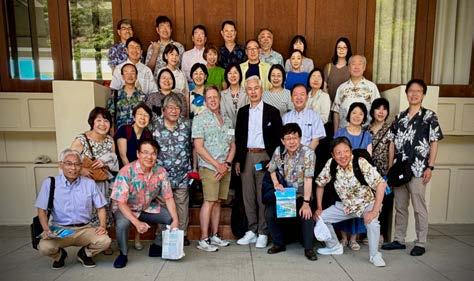
Japanese law leaders visit to discuss international programs
—July 23, 2024
The William S. Richardson School of Law at the University of Hawaiʻi at Mānoa welcomed a delegation of 30 distinguished lawyers, executive leaders and their spouses from the Japan Federation of Bar Associations (JFBA) on July 22.
Richardson Professor Mark Levin, director of the UH Mānoa Center for Japanese Studies and director of the law school’s Pacific-Asia Legal Studies Program, led the tour of the campus with discussions that focused on Richardson’s international programs.
“We are fortunate to have had a longstanding relationship with JFBA that has helped to provide opportunities for collaboration and learning on both sides,” Levin said. “Our programs that bridge borders help prepare our students for a rapidly changing world where international knowledge is critical.”
The group included former JFBA President Attorney Motoji Kobayashi, and many recent
vice presidents from 2022–2024, including all six of the women in the class of 2022–23, which was the largest group of women leaders in the organization’s history.
Richardson’s Master of Laws and Advanced Juris Doctor programs for foreign-trained lawyers, along with the Visiting Scholars program, have many graduates and current students from Japan. They come to Hawaiʻi to study law in the U.S. at a school that values Japanese legal studies and is located close to Japan.
Since 2002, Richardson Law has welcomed a number of JFBA working delegations, with sessions looking at the structure of legal education in the U.S., the U.S. jury system, Hawaiʻi’s trust law systems and other topics. However, this was the largest JFBA group to visit the campus—bringing attention to Richardson’s engagement with Japanese law and society in faculty research, student scholarship and pedagogy. ❖
Glen S. Fukushima visits Richardson Law for student talk and reception
—April 17, 2025

On Monday, March 24, the William S. Richardson School of Law had the honor of hosting Glen S. Fukushima for a day of student engagement, cross-cultural dialogue, and connection with faculty, alumni, and Hawai‘i’s legal and diplomatic communities.
Mr. Fukushima currently serves as Vice Chair of the Securities Investor Protection Corporation and is a Senior Fellow at the Center for American Progress in Washington, D.C.
He began the day at Richardson Law by joining first-year students for a Professionalism in Practice (PIP) session, organized in partnership with the Pacific-Asian Legal Studies (PALS) Program and the International and Comparative
Law Program. Drawing from a distinguished career that has spanned both public service and corporate leadership in the U.S. and Japan, Mr. Fukushima spoke candidly about the intersection of law, business, and diplomacy in the AsiaPacific region.
His talk emphasized the growing significance of cultural competence in legal work, the dynamic nature of U.S.-Asia economic relations, and the wide range of career opportunities available to law graduates interested in international fields. Students were engaged throughout the session, asking thoughtful questions and gaining realworld perspective on how their legal training can open doors to global leadership roles.
INTERNATIONAL INTERNATIONAL INTERNATIONAL
Professor Mark Levin, Director of the PacificAsian Legal Studies Program, reflected on the significance of Mr. Fukushima’s visit.
“We might now take for granted the so-called ‘gaiben’ system—allowing foreign lawyers and law firms to operate in Japan—but it was Glen S. Fukushima, serving as the United States’ official representative, who played the pivotal role in opening the Japanese legal services market that was still closed when I began my career there in 1983.”
“Looking ahead, Glen Fukushima emphasized the unique ‘Hawai‘i Advantage’—a perspective rooted in our distinct experiences and expertise, which positions our students to thrive in Washington, D.C. and other global centers. His visit gave our students a rare opportunity to engage with someone whose career has shaped trade, law, and diplomacy between the U.S. and Japan at the highest levels,” said Professor Levin.
That evening, Dean Camille Nelson welcomed Mr. Fukushima and a select group of alumni, faculty, and special guests to a reception in the Law Library. The event honored his longstanding contributions to international law, education, and diplomacy. Among the attendees were Consul General of Japan in Honolulu Yoshinori Kodama and Hawai‘i Supreme Court Associate Justice Sabrina McKenna, both of whom have played pivotal roles in strengthening Hawai‘i’s ties with Japan.
“It was an absolute honor to welcome Glen Fukushima to Richardson Law. His distinguished career and longstanding commitment to fostering dialogue between the U.S. and Japan exemplify the kind of global engagement we hope to inspire in our students.” Dean Nelson continued, “Mr. Fukushima’s visit reminded us of the power of legal education to serve as a bridge between nations, cultures, and communities—and of Hawai‘i’s unique place in that conversation.”
The reception offered a warm setting for informal conversation, shared insights, and reflections on decades of cross-Pacific partnership. Attendees expressed appreciation for Mr. Fukushima’s continued leadership and advocacy for collaboration across legal, political, and cultural boundaries.
Mr. Fukushima’s visit to the Law School was part of the University of Hawai‘i at Mānoa’s first-ever U.S.-Japan Leaders in Residence program, a new initiative of the Center for Japanese Studies.
The Law School extends its deepest thanks to Glen S. Fukushima for generously sharing his time and insight; to the Center for Japanese Studies for organizing the visit; to Consul General Yoshinori Kodama for his meaningful presence; and to Richardson 1L students Hannah Hawley and Wayland Fong for their thoughtful contributions to the PIP session. ❖
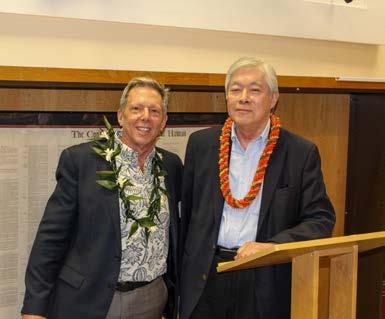
“[...] it was Glen S. Fukushima, serving as the United States’ official representative, who played the pivotal role in opening the Japanese legal services market that was still closed when I began my career there in 1983.”
—Professor Mark Levin

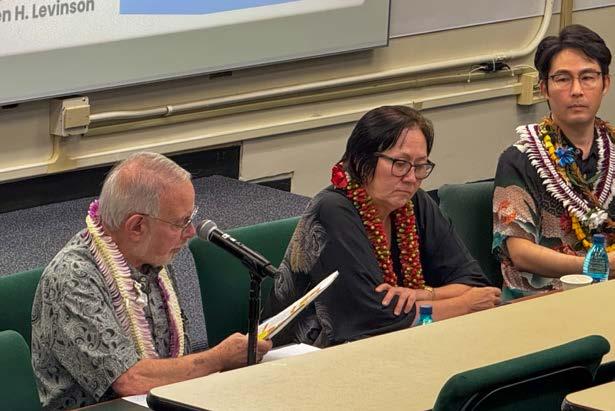
UH law school hosts seminar on marriage equality featuring Hawaiʻi Supreme Court justices
Nov. 18, 2024
On Nov. 4 at the William S. Richardson School of Law, the Asian-Pacific Law and Policy Journal (APLPJ) and Lambda Law Student Association co-sponsored a seminar titled “Baehr v. Lewin
Revisited: Japan’s Same-Sex Marriage Cases and the Fight for Constitutional Protections of Marriage Equality”. The event featured distinguished

Associate Justice Sabrina Shizue McKenna, former Associate Justice Steven H. Levinson, Dr. Brandon Marc Higa.
MARRIAGE EQUALITY
speakers, including Hawaiʻi Supreme Court
Associate Justice Sabrina Shizue McKenna ’82, former Associate Justice Steven H. Levinson and Dr. Brandon Marc Higa ’19
J.D. & ’24 S.J.D.
Dean Camille Nelson delivered the opening address, highlighting the importance of comparative law and the timeliness of this discussion with Constitutional Amendment One on the ballot for Hawaiʻi voters. Joshua D. Faumuina ’26 gave introductory remarks, presenting this seminar as an extension to his co-authored publication in APLPJ on Japan’s same-sex marriage case, and an opportunity to celebrate the recent victory in the Tōkyō High Court, which recognized the same-sex marriage ban as unconstitutional under equal protections grounds.
“We were delighted to host this important conversation, which could not have been more timely. It is demonstrative of the interconnections between places jurisprudentially, historically, and contemporarily,” Dean Nelson said. “As the law continues to shift in dynamic ways, ensuring protections for inclusive justice calls for excellent lawyering, as is the hallmark of our mission at the William S. Richardson School of Law.”
This event inspired a lively debate regarding
Hawaiʻi’s landmark Baehr v. Lewin case, which set the stage for global conversations on the constitutionality of same-sex marriage, influencing similar discussions in Japan. This event attracted 50 attendees, including pre-law majors interested in future careers in law at Richardson, current law students and attorneys who received continuing legal education credits from the Hawaiʻi State Bar Association.
“This event is a testament to the dedication of our students, who brought this critical conversation to our law school at such a pivotal time in the global movement for marriage equality,” Dr. Higa said. “The ripple effects of Baehr v. Lewin continue to resonate, illustrating the historic evolution of marriage equality laws in Hawaiʻi and the U.S.”
APLPJ Co-Editors-in-Chief Edward Stern and Jennifer Tse, alongside Lambda President Jessie Ho, expressed gratitude to those who made the event possible. Special thanks were extended to Professor Mark A. Levin, Director of the Mānoa Center for Japanese Studies, Cathy Betts of the Hawaiʻi State Bar Association and the William S. Richardson School of Law Alumni Association for their sponsorship and support. ❖

Richardson Law launches
the Soifer Lectures with inaugural speaker Professor Ellen P. Goodman
April 24, 2025
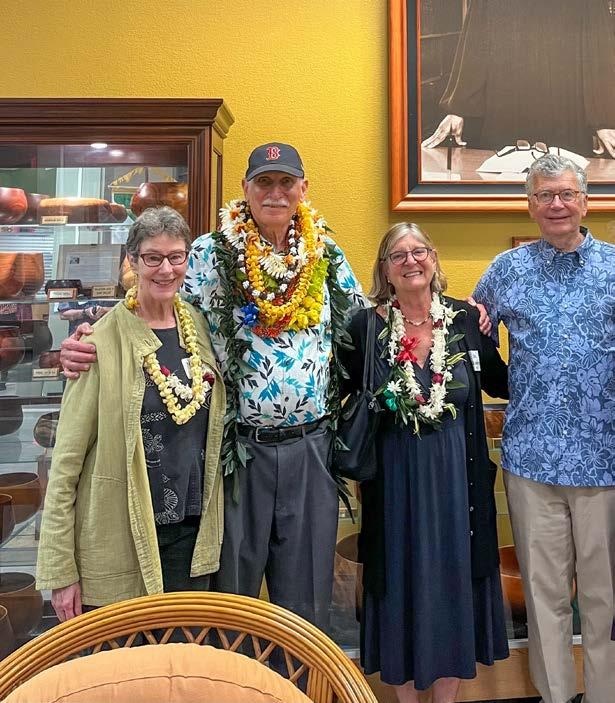

The William S. Richardson School of Law proudly launched a new lecture series on March 7, 2025, with the first installment of the Soifer Lectures. Thanks to a generous gift from the Hundt Family Foundation and other supporters, this event series honors Professor Emeritus Avi Soifer, a prolific constitutional law scholar and former dean of Richardson Law, whose contributions continue to impact legal education and scholarship.
The inaugural speaker, Professor Ellen P. Goodman, Distinguished Professor at Rutgers Law School and Co-Director of the Rutgers Institute of Information Policy & Law, delivered a compelling lecture that engaged faculty, students, and community members alike.

Professor Goodman explored the timely and thought-provoking question: “Should we Americans still revere the law, and if so, how can that reverence be made justifiable and effective?” Drawing inspiration
from Abraham Lincoln’s Lyceum Address, her discussion examined the role of law in contemporary society, emphasizing human agency and power in the face of tech-fueled subordination.
Following the lecture, attendees gathered in the law library for a reception celebrating Avi Soifer’s profound contributions to the legal community and the law school.
A distinguished legal scholar, Soifer served as dean of the law school from 2003 to 2020 and continued teaching and writing until his retirement in the summer of 2024. Throughout his career, he has been recognized for his unwavering commitment to justice and his mentorship of countless students and colleagues.
The Soifer Lectures will continue to feature distinguished legal scholars, providing a platform for critical discussions on law, justice, and society. The next lecture will be held in March 2026.❖
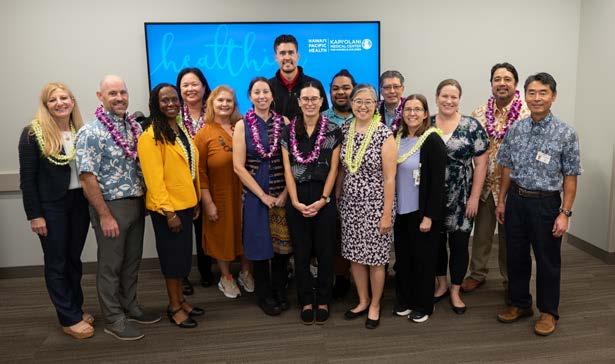
EXPANDING MEDICAL-LEGAL AID
New partnership expands medical-legal support for Hawaiʻi families
Nov. 22, 2024
The William S. Richardson School of Law at the University of Hawai‘i at Mānoa has announced an exciting collaboration between the MedicalLegal Partnership for Children in Hawai‘i (MLPC) and Kapi‘olani Medical Center for Women & Children. This partnership, which began earlier this year and officially launched on Nov. 18, expands the reach of MLPC’s critical work, addressing the social factors that impact child and family well-being.
The new MLPC program site at Kapi‘olani Medical Center was funded by the Hawai‘i Department of Health (DOH) through a grant to address health disparities and advance health equity. This partnership builds on the MLPC’s longstanding relationship with Kōkua Kalihi Valley Comprehensive Family Services (KKV). Since 2009, the MLPC has worked closely with KKV to provide free legal services to low-income families, focusing on medical-legal issues like housing stability, income support and family law.
“By partnering with the communities we serve, we have effectively addressed policy and systemic advocacy issues like restoring Medicaid benefits for Micronesians and advocating for language access and immigrant rights in Hawai‘i.
—Dina Shek
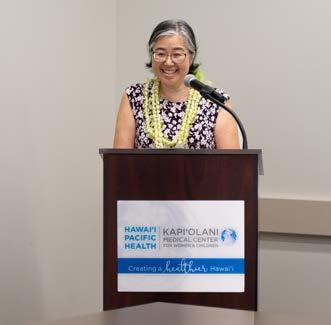
The MLPC is a unique initiative that pairs legal professionals with health care providers to tackle issues affecting patients’ overall health and wellbeing. This model, now being implemented at Kapi‘olani, involves offering on-site legal services at the medical center, educating health care professionals on legal matters and engaging in policy advocacy to create systemic change.
“Our MLPC collaboration works because we co-locate ‘legal care’ and ‘health care’ in trusted health care settings. This means our lawyers might be able to meet with families right in their exam rooms during appointments,” said Dina Shek ‘06, legal director of the Medical-Legal Partnership for Children in Hawai‘i. “By partnering with the communities we serve, we have effectively addressed
policy and systemic advocacy issues like restoring Medicaid benefits for Micronesians and advocating for language access and immigrant rights in Hawai‘i.”
The new partnership at Kapi‘olani Medical Center for Women & Children allows the MLPC team to extend its reach, offering support to families with hospitalized children who may face legal challenges affecting their health and well-being.
In one case, MLPC expedited a stalled reasonable accommodation request in public housing that had prevented a safe discharge for a hospitalized child.
The MLPC attorney’s work made it possible for the housing changes to happen more quickly, which significantly shortened the hospital stay, resulting in significant cost savings and more stable housing for the family.
“This partnership with the UH Richardson School of Law has been a game changer for me and the entire social work department,” said Waynell Hee-Goodman, manager of medical social services at Kapi‘olani. “The legal guidance gives us more confidence in our ability to help patients address issues like food insecurity and transportation to clinical care.”
Dr. Kenneth Nakamura, chief of pediatrics at Kapi‘olani, sees the significance and impact of these collaborations. “Community partnerships in both education and patient care are timeless and have progressively improved the health and well-being of Hawai‘i’s people over many generations. This is part of Hawai‘i Pacific Health’s mission to create healthier communities — not just for some, but for all our people.”
Since its founding in 2009, the MLPC has served nearly 2,000 families. The program’s innovative approach, which integrates legal services into health care settings, has empowered families to navigate complex systems more easily. Being embedded into health care sites allows the MLPC to work with health care providers to ensure that social and economic factors do not impede medical care.
“When we think about how our health care systems are or should be designed, our partnership with Kapi‘olani provides an ideal

model in many ways. We’re working together to integrate different areas of expertise to help address not just an immediate medical need, but also the health-harming social needs all at once,” said Ashley Kaono ‘20, staff attorney for the Medical-Legal Partnership for Children in Hawai‘i. “I’m grateful for the opportunity to be a part of this amazing alliance, and look forward to all the good

The success of MLPC’s collaboration with KKV has set the stage for this new partnership at Kapi‘olani. Key funding for the new site comes from the Hawaiʻi Department of Health and a new federal grant from the Medical-Legal Partnership Plus program under the U.S. Dept. of Health & Human Services. As the program moves forward, additional support from Kapi‘olani, KKV, the Hawai‘i Justice Foundation, the Hawai‘i State Judiciary and the University of Hawai‘i, will continue to play an essential role in championing health justice for local
The MLPC remains dedicated to ensuring that families have access to the support they need. It provides direct legal assistance while advocating for meaningful policy changes that uplift the community. This collaboration between health care and legal services continues to create a tangible, positive impact on Hawai‘i’s families and
HIP EXONERATION
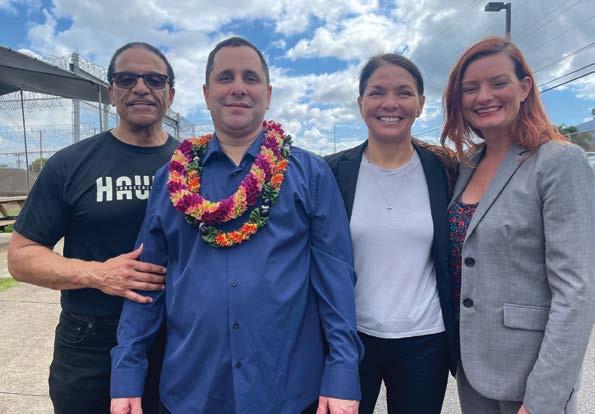
Feb. 25, 2025
Hawaiʻi Innocence Project secures exoneration of Gordon Cordeiro after 30 years
After spending more than three decades behind bars for crimes he did not commit, Gordon Cordeiro walked free this week—exonerated through the dedicated efforts of the Hawaiʻi Innocence Project (HIP). On Feb. 21, Cordeiro had his conviction vacated and was freed.
HIP, founded in 2005 at the William S. Richardson School of Law, fights for the freedom of those who have been wrongfully convicted and works towards the prevention of future injustice. HIP is a law clinic and nonprofit with a mission to free prisoners who are factually innocent but who have been wrongfully convicted.
Cordeiro’s wrongful conviction was overturned after new evidence, including DNA testing, proved his innocence. The legal team at HIP, led by Co-Directors Rick Fried and Ken Lawson, Associate Director Jennifer Brown ‘17, and volunteer attorney Gina Gormley, worked tirelessly on his case, alongside current and former HIP students who played a vital role in the investigation and legal proceedings.
“Gordon’s conviction was vacated on grounds consistent with his innocence (which HIP knew all along). Gordon was tried twice, with the first trial ending with a hung jury where 11 of the 12 jurors were in favor of acquittal. At the second trial, where he was found guilty, the state added


testimony from four jailhouse snitches to go with their star witness—the man who was originally the primary suspect in the 1994 murder. New DNA evidence demonstrates that Gordon did not murder and rob the suspect, but an unknown person, along with the state’s star witness, did,” Ken Lawson said.
“Many HIP students worked on Gordon’s case over the years, and HIP never gave up. HIP kept doing DNA testing and interviewing witnesses, including the jailhouse informants who recanted their false testimony that Gordon wrote a map and other incriminating statements on paper and in a Bible,” Ken Lawson said. “HIP hired a handwriting expert who found that the informants’ recantations were true because their handwriting matched the documents, and Gordon’s handwriting did not. HIP students interviewed those informants and went to the crime scene numerous times.”
Cordeiro’s exoneration marks a major victory in the fight for justice, but cases like his highlight the critical need for funding to continue HIP’s work. DNA testing alone costs upwards of $100,000
“
We never give up on trying to find new evidence, and within all ethical boundaries, we fight like hell for their freedom.
—Ken Lawson
per case, and HIP relies on donations to support these efforts, as well as the work of dedicated attorneys and students advocating for the wrongfully convicted.
HIP Co-Directors Rick Fried and Ken Lawson, HIP Associate Director Jennifer Brown, and HIP volunteer attorney Gina Gormley want to thank all current and former HIP students who worked on Gordon’s case.
“One of the lessons that HIP instills in the students is that we believe in our clients and their innocence. So, no matter how bleak a client’s case may look, we don’t quit,” said Ken Lawson. “We never give up on trying to find new evidence, and within all ethical boundaries, we fight like hell for their freedom.”
HIP’s mission extends beyond exonerations—it is about restoring lives, preventing future injustices, and training the next generation of lawyers committed to justice. Support HIP’s work by making a donation today. ❖


The William S. Richardson School of Law at the University of Hawaiʻi at Mānoa is commemorating its 50th anniversary.
Opened in 1973, Richardson is the only law school in Hawaiʻi. Its founder and namesake, William S. Richardson, spearheaded the drive to establish the school beginning in 1966. Known as “CJ” in the law school community, he served as a community leader in many roles, including as the chief justice of the Hawaiʻi Supreme Court from 1966 to 1982. He was also a trailblazer and passionate advocate for Hawaiʻi’s diverse communities, pushing to expand Native Hawaiian rights and
broadening the rights for people to challenge important environmental and land development decisions.
The first class of 53 students began their studies in wooden buildings in the Quarry. After growing and expanding programs, the school eventually moved to its current home on Dole Street in 1983. That same year, the Law Library opened, and the school was officially named after William S. Richardson. In 2019, the Clinical Building opened its doors. More recently, the law school launched a part-time online program in fall 2023.
Over the years, the law school has partnered with many of its thousands of alumni and other
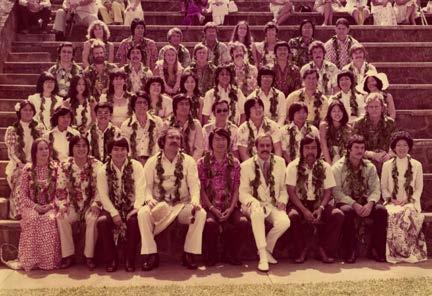
community members to bring the best of the best to campus. That includes hosting U.S. Supreme Court justices, the Hawaiʻi Supreme Court, the Ninth Circuit Court of Appeals, and countless expert speakers and lecturers.
Richardson has also consistently received high marks in several national rankings, including No. 23 for its part-time and environmental law programs, No. 66 for international law, No. 71 for legal writing, No. 74 for dispute resolution, No. 78 for constitutional law, and No. 91 for contracts/commercial law by U.S. News & World Report. The law school was also recognized as No. 2 in the nation for most diverse faculty, No. 4 for most chosen by older students, and No. 8 for best for state and local clerkships by The Princeton Review.
In a PBS Hawaiʻi interview from 2009, William S. Richardson reflected on the importance of opening a law school in the islands. He died the following year at the age of 90.
“I’m proud of it because it means that some people who wouldn’t have had a chance to go to law school now have that opportunity,” he told host Leslie Wilcox. He added that he enjoyed talking with students and respected their ideas and opinions.
Events to celebrate the 50th anniversary were held throughout the 2023-24 academic year, leading up to the school’s gala on May 31. Tickets for the gala are sold out, but donations are still welcomed. ❖
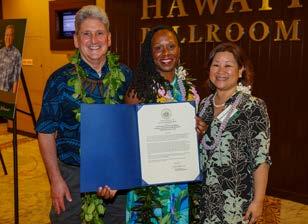

LAW SCHOOL 50th GALA




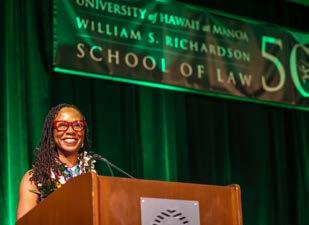

Mahalo to everyone who attended our gala! Let us celebrate our eight distinguished alumni from several different decades who were recognized at our gala, as they continue to make a difference in our community and around the world.
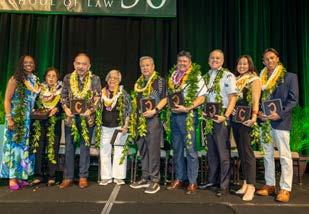
Abelina Madrid Shaw ’76
John D. Waiheʻe III ’76
Esther Kwon Arinaga ’85
Scott K. Saiki ’91
William Keoniakelelani Shultz ’00
Cameron Nekota ’02

Kimi Murphy Ide-Foster ’14
ʻOlu Campbell ’15

Celebrating
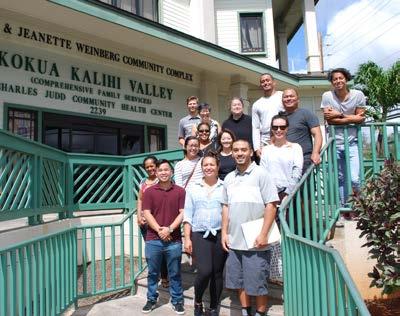

The William S. Richardson School of Law is proud to celebrate the 50th anniversary of the Ulu Lehua Scholars Program, a groundbreaking initiative that has opened the doors of legal education to students from myriad backgrounds and diverse communities since 1974.
Rooted in a deep commitment to justice and uplift, the Ulu Lehua Scholars Program reflects the law school’s mission to make legal education accessible to those who demonstrate academic potential, leadership and a dedication to community service. Since the establishment
—Oct. 14, 2024
of the program, the law school has graduated 445 scholars. “The Ulu Lehua Scholars Program is an important aspect of fulfilling our mission as a law school committed to Hawai‘i, the larger Pacific Region, to justice and professionalism,” Dean Camille Nelson said. “We are proud of the ways in which this program has recognized talent in our communities both near and far, and the determination of people to make a difference through the expertise and insight that comes from a legal education.”
Each year, a select group of scholars—chosen for their academic promise and their commitment to justice and the rule of law—embark on a journey that begins with a tailored first-year curriculum designed to foster their growth in
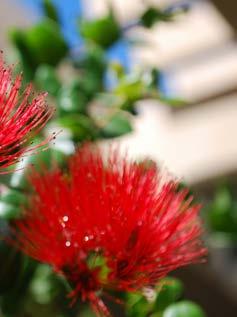
Ulu Lehua Scholars Program 50 years

a supportive professional environment. These students benefit from a unique learning experience that empowers them to thrive in law school and beyond.
“I am so impressed every year with the caliber of our Ulu Lehua Scholars and the passion for justice that they bring to our Richardson community,” said Troy Andrade, Director of the Ulu Lehua Scholars Program. “From our early days in the quarry as the Pre-Admission to Law School Program, our Lehua Program has guided some of the most talented legal minds in Hawai‘i and across the Pacific to careers in service of others.”

Over the past five decades, the Ulu Lehua Scholars Program has cultivated a community of leaders. Lehua alumni have gone on to assume leadership roles in government, the judiciary, social justice organizations, and prestigious legal positions, including clerkships with the Hawaiʻi Supreme Court and the federal judiciary. This year, the program was also recognized by the American Bar Association with the 2024 Diversity Leadership Award, further highlighting its profound impact on the legal landscape.
The William S. Richardson School of Law hosted a gala on Nov. 2 to commemorate the program’s milestone and to raise support for future Lehua Scholars.
For more information on the program or to donate, please visit: law.hawaii.edu/ululehua.
We spoke with three Ulu Lehua Scholars and one alumna to discuss their experience in the program.

ANGIE ANDERSON ‘25
As a former independent artist, Angie pursued law school to become a legal advocate for underrepresented voices in Hawaiʻi’s arts and entertainment industry. The Lehua community has been her “guiding star” throughout this journey.
She shared how meeting an alumnus during her first-year summer internship shows the strength of the Lehua network. “The care and generosity extended to me during that time showed me how invaluable the Lehua Scholars program is—not just in law school, but in life and career.”
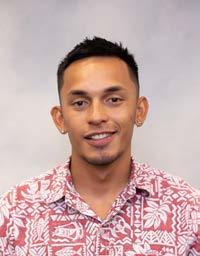
BRONSON GONZALES ‘26
Growing up in Waiʻanae on the island of Oʻahu, Bronson says he witnessed firsthand the harmful stereotypes surrounding his community. Determined to break those negative narratives, he chose law school to challenge these perceptions and serve as a role model for future generations.
“The Ulu Lehua Scholars Program has provided me with a supportive community and mentorship, empowering me to push forward in my pursuit of justice,” Bronson shared. A key moment for him came when Prof. Andrade encouraged scholars to reflect on their motivations for attending law school—a powerful reminder that reignited his passion.


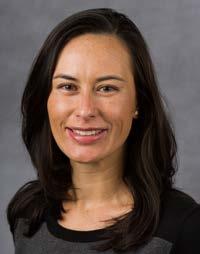
ASHLEY KAONO ‘20
Ashley’s passion for public service grew while working with the Legal Aid Society of Hawaiʻi, where she witnessed firsthand the challenges people with disabilities face in accessing legal representation. Inspired by the need for more advocates in this area, she pursued law school to address those gaps. She is now a staff attorney with the Medical Legal Partnership for Children, an organization she learned about as a first-year Lehua Scholar.
“The Ulu Lehua Scholars Program gave me a community rooted in shared values of accessibility and social justice,” Ashley said. Graduating during the pandemic, she leaned on the Lehua network to navigate an uncertain time. “The program’s support during that period was invaluable. The connections and friendships I made carried me through law school and beyond.”

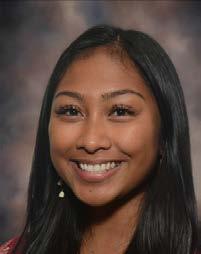
KAYLA ONGOY ‘25
Before attending law school, Kayla worked with at-risk youth across Hawaiʻi, an experience that ignited her passion for advocacy. “The resilience of the keiki I worked with inspired me to apply to the William S. Richardson School of Law,” she said. Determined to protect the state’s most vulnerable populations, Kayla chose law school to advocate for children’s rights.
Kayla credits the Ulu Lehua Scholars Program with providing her the tools to succeed. “The program has supported my personal and professional growth, connecting me with valuable experiential learning opportunities in family law.”
A powerful moment for her was watching a tribute to Professor Judy Weightman, which deepened her commitment to using her legal education to make a meaningful impact.

Dean Camille Nelson receives prestigious 2025 Deborah L. Rhode Award presented by the AALS
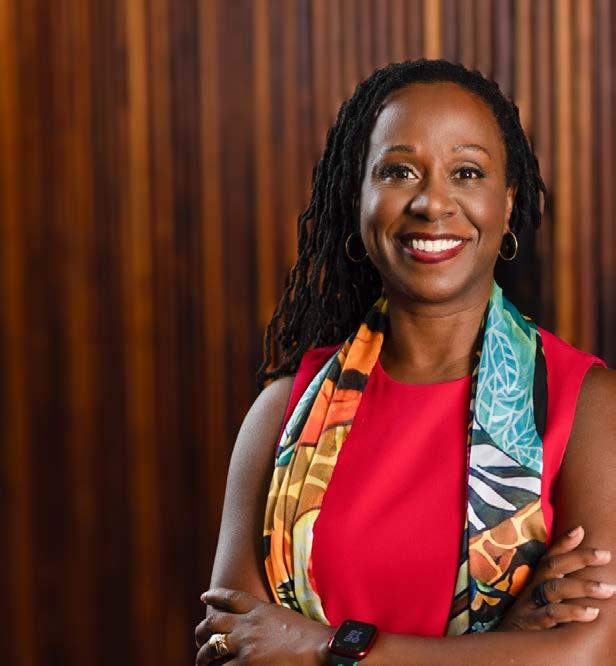
Jan. 02, 2025
LEADERSHIP & EXCELLENCE
Camille A. Nelson, Dean and Professor of Law of the William S. Richardson School of Law at the University of Hawaiʻi at Mānoa, has been selected as a recipient of the 2025 Deborah L. Rhode Award presented by the American Association of Law Schools (AALS). Dean Nelson will receive this award at the AALS Annual Meeting on Jan. 9, 2025 in San Francisco, California.
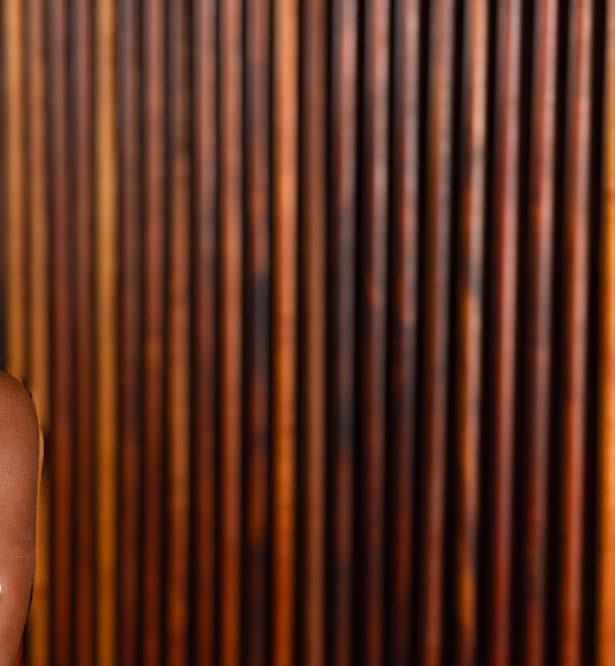
The award is a joint recognition by AALS sections Leadership, Pro Bono & Service Opportunities, Professional Responsibility, and Women in Legal Education. It honors individuals, like Deborah L. Rhode, who exemplify groundbreaking contributions and inspired action in advancing leadership, professional responsibility, pro-bono service and gender equality in law.
“I am truly humbled by this recognition,” Dean Nelson said. “It means so much to me – more than I can adequately convey. It is incredible and fills me with joy and appreciation to have my name uttered in the same breath as the legendary Deborah Rhode. I consider myself blessed to be included among the other recipients of this prestigious Award. You made my year – thank you!”
Dean Nelson shares the prestigious honor with Jessica Steinberg, John Marshall Harlan Dean’s Research Professor of Law at George Washington University Law School.
“All of this year’s nominees for the Deborah L. Rhode Award were incredibly inspiring,” said Janine Dunlap-Kiah and Deborah Schlosberg, co-chairs of the award selection committee. “The Committee is thrilled to recognize Dean Nelson and Professor Steinberg for their impactful work. They both are shining examples of Professor Rhode’s commitment to access to justice and gender law and policy. We are confident that they will continue to blaze the trail for their colleagues in the legal academy and leave a lasting legacy just as Professor Rhode did.”
In addition to her leadership impact and teaching excellence, her research and writing are far-reaching in their focus. Her capacious appreciation of legal scholarship in its historical, international, and interdisciplinary contexts has implications for areas as vast as criminal law defenses, policing, cultural studies in legal theory and musicology, mental health implications for tort law, as well as critiques of historical applications of property law during American and West Indian slavery.
Her research has recently also highlighted topics in higher education, such as explorations of technological transformation, diversity, inclusion and equity, and organizational behavior in the legal academy. ❖
NATIONAL DIVERSITY


The Ulu Lehua Scholars Program ensures that Hawai‘i’s diversity – in its many forms – is reflected in the law school’s student body.
AWARD
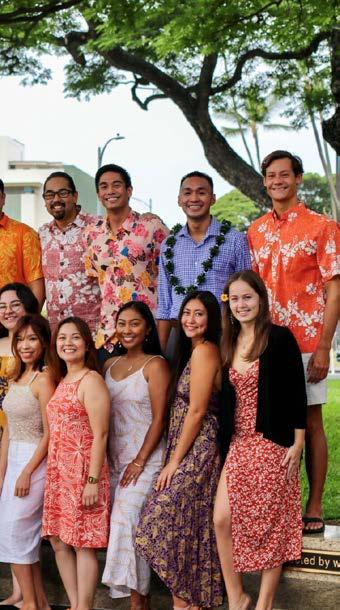
Richardson’s Ulu Lehua Scholars Program wins national diversity award
May 15, 2024
The Ulu Lehua Scholars Program at the University of Hawai‘i at Mānoa William S. Richardson School of Law recently earned the prestigious 2024 Diversity Leadership Award from the American Bar Association.
The award recognizes a program’s outstanding commitment to promoting access and inclusion in the legal profession to women, people of color, people with disabilities, and people of different sexual orientations and gender identities.
This is the first time the UH law school has received this award. Professor Troy J.H. Andrade ’11, director of the Ulu Lehua Scholars Program, accepted the award at the ABA Litigation Section’s annual conference in Washington, D.C. on May 2.

“This recognition is a testament to the fifty years of students who have gone through the program and become leaders in our community,” said Andrade, who is also an Ulu Lehua graduate. “I’m honored to be given the kuleana of supporting our Lehua Scholars and carrying on the legacy of access and opportunity that has been created by my predecessors like Linda Krieger, Chris Iijima, Judy Weightman and George Johnson, to name a few.”
Established in 1974, the Ulu Lehua Scholars Program, formerly known as the Pre-Admission Program, ensures that Hawai‘i’s diversity – in its many forms – is reflected in the law school’s student body.
Each year, the law school selects twelve incoming JD students who have overcome adversity, and demonstrated their academic potential, leadership ability, and commitment to social justice. The program
BELOW | Andrade accepted the Diversity Leadership Award on behalf of the Ulu Lehua Scholars.

provides students with support, mentorship and individualized learning opportunities.
“I am so proud of our Ulu Lehua Scholars and the indelible mark they have made in our Richardson community and beyond,” said UH law school Dean Camille Nelson. “We look forward to many more years of this
program’s success and dedication to serving Hawai‘i’s diverse communities.”
The program is also celebrating its 50th anniversary this year. For more information on upcoming events, please visit law.hawaii.edu/ululehua. ❖
“This recognition is a testament to the fifty years of students who have gone through the program and become leaders in our community.”
–Troy J.H. Andrade ’11
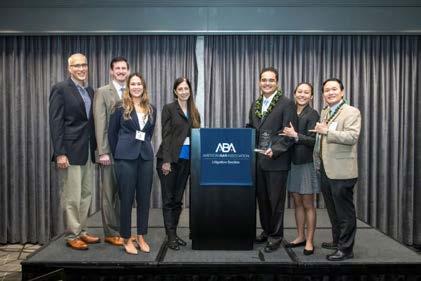
LEFT | Andrade and Richardson conference attendees with ABA President Mary Smith and ABA Secretary Marvin Dang.
UH Law School receives $250,000 grant for professional identity development
—April 11, 2025
The Mellon Foundation has awarded a $250,000 grant to the University of Hawaiʻi at Mānoa’s William S. Richardson School of Law to develop new approaches to the formation of law students’ professional identity. Led by Professor Eduardo R.C. Capulong, Director of Experiential Learning, the initiative, “Pluralizing Professional Identity,” will create new educational materials and opportunities aimed at strengthening the legal profession’s commitment to democracy and the rule of law.
The initiative comes at a pivotal time for legal education and the legal profession. The last few years have seen the largest, most diverse incoming law school classes and some of the most serious challenges to law practice. Recognizing
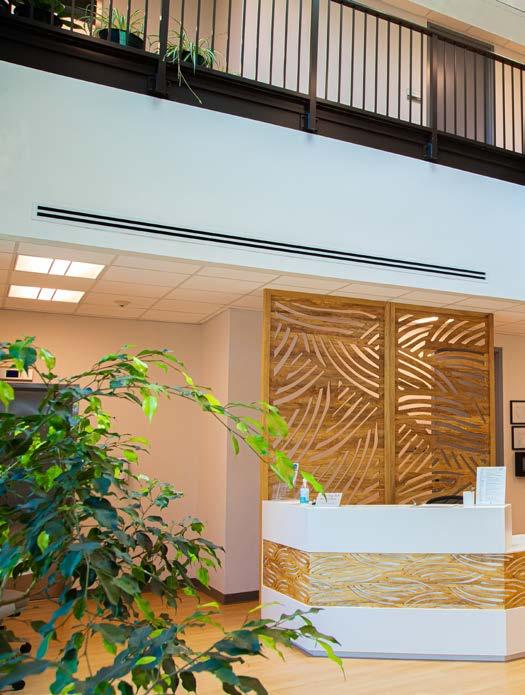
the increasingly varied backgrounds of today’s law students, the project seeks to enhance legal education by drawing on these students’ experiences and exploring the core principles that define the legal profession.
“We are grateful to the Mellon Foundation for supporting this timely and important work,” said Dean Camille Nelson. She continued, “this grant affirms our commitment to preparing future lawyers who are grounded in integrity, guided by purpose, and ready to meet the moment.”
Strengthening the Democratic Ethos of the Legal Profession and the Rule of Law
The project will support the development of programs that align with American Bar Association (ABA) accreditation
standards that require the “intentional exploration of the values, guiding principles, and well-being practices considered foundational to successful legal practice.”
In collaboration with law faculty from the University of Montana, University of Washington, and Georgia State University College of Law, the two-year project will bring together faculty, students, and legal professionals to develop materials that encourage thoughtful reflection on the responsibilities and ethics of law practice. The project will also include research, symposia, and training opportunities to share these insights with the broader community.
“The law school curriculum needs to address the needs and experiences of all of our students,” said Professor Eduardo
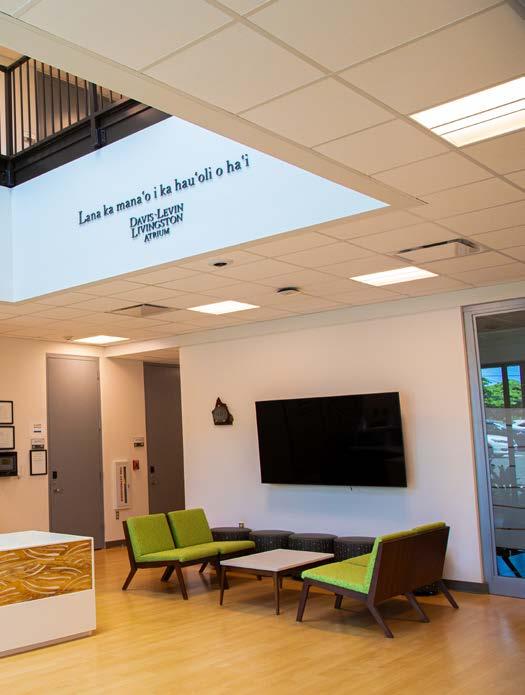
R.C. Capulong, the principal investigator of the grant. “And especially now, it needs to model lawyering practices that promote democracy and the rule of law.”
Advancing Legal Education at Richardson Law
The William S. Richardson School of Law is nationally recognized for its engaged learning environment and commitment to legal excellence. The school provides students with the skills and knowledge they need to succeed in a rapidly evolving legal landscape.
With the Mellon Foundation’s support, this initiative will contribute to shaping the next generation of legal professionals by fostering a deeper understanding of their role in upholding the principles of the profession. ❖

A Legacy of Developing Ethical Leaders
The William S. Richardson School of Law is a collaborative, multicultural community preparing students for excellence in the practice of law and related careers that advance justice and the rule of law. We develop highly qualified, ethical professionals through excellence in teaching, scholarship, and public service.
We embrace Hawai‘i’s diversity and values and recognize a special responsibility to our state and the Pacific region.



